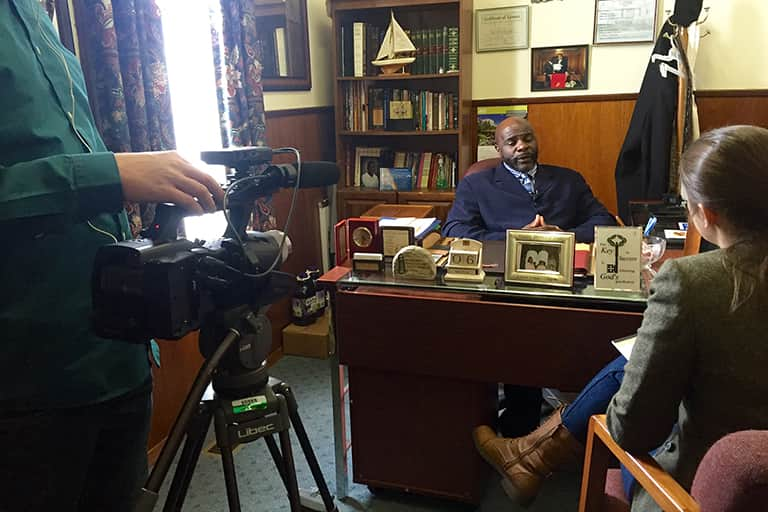The Flint Water Crisis has captured the attention of media outlets and viewers from around the world, and WKAR and the College of Communication Arts and Sciences are continuing their efforts to share the city’s troubling narrative.
WKAR and Great Lakes Echo, a regional news service that covers eight states and two provinces and is produced by the MSU School of Journalism’s Knight Center for Environmental Journalism, have been reporting on water quality concerns in Flint for more than a year. They have been covering the latest developments and creating a dialogue on the health risks and possible solutions.
Capital News Service, produced by MSU’s School of Journalism, also has been covering the issue. Last week, it sent out a story about how other communities have the same lead pipes as Flint, titled “If Flint water is unsafe, what about yours?”
As the story of the Flint water crisis unfolds, ComArtSci students and faculty are coming together to share more stories that show the impact on the Flint community.
Geri Alumit Zeldes, Associate Professor in the School of Journalism, recently traveled to Flint with one of her students, two recent ComArtSci graduates and a WKAR production team to record interviews and scenes for investigative news segments that will air in mid-Michigan during PBS NewsHour Weekend (5 p.m. Saturdays and Sundays on WKAR-TV) in February.
ComArtSci students also are taking it upon themselves to create graphics and timelines to help share Flint’s story.
"Long after the satellite trucks have left, the School of Journalism and ComArtSci will be here, like we have been,” Zeldes said. “We've worked in Flint for the last seven years, documenting environmental issues. We'll be here five, 10 years from now, covering the impact of this water crisis."
ComArtSci faculty have been called upon as media experts to comment on the coverage of the Flint water crisis.
Dave Pouslon, Professor in the School of Journalism and Associate Director of the Knight Center for Environmental Journalism, recently spoke with Poynter about the media’s role in covering this crisis.
Great Lakes Echo Coverage
Gary Wilson, columnist for Great Lakes Echo, has been covering the issue for more than a year. His remarks about the Flint water have been featured several times this past year on the WKAR “Current State” Great Lakes Month in Review, which Great Lakes Echo co-sponsors.
The Great Lakes Echo coverage includes these stories:
- “Flint water, Detroit air casualties of environmental justice” by Courtney Bourgin (Jan. 23, 2016)
- “Failures to follow law caused Flint water crisis” by Nicholas Schroeck (Jan. 22, 2016)
“Great Lakes Echo strives not to duplicate what other media are covering. We want to be the first to tell the public an environmental story that otherwise would be left untold by other media,” said Eric Freedman, Professor of Journalism and Director of the Knight Center for Environmental Journalism. "When a major issue arises that gets widespread press coverage, such as the Flint water crisis, we may do stories, but they will almost always focus on an aspect that other media haven’t reported about.”
WKAR Coverage
Since January 2015, WKAR’s “Current State” has interviewed a number of politicians and experts on the topic including DEQ Director Dan Wyant, Former Emergency Manager of the City of Flint Darnell Earley, Flint Mayor Karen Weaver, State Senator Jim Ananich, State Representative Dan Kildee, Lansing Mayor Virg Bernero, Political Analyst Bill Ballenger and Michigan Public Radio Network’s Rick Pluta.
A recent interview by “Current State” discussed the Pediatric Public Health Initiative, a new partnership between MSU’s College of Human Medicine and Hurley Medical Center that will address the Flint community’s long-term impacts of lead exposure, particularly on the children of Flint. The interview was with Dr. Dean Sienko, Associate Dean at the MSU College of Human Medicine, and Dr. Mona Hanna-Attisha, Director of Pediatric Residency at Hurley Children’s Hospital and Assistant Professor of Pediatrics at MSU’s College of Human Medicine, who played a key role in bringing attention to the water problem in Flint.
The Flint water crisis also has been the lead story on WKAR’s “Off the Record.” Last week’s show had guest Attorney Michael Pitt, who has filed class action lawsuits against Gov. Rick Snyder regarding the Flint water crisis.
For a complete listing of WKAR’s coverage, see the WKAR Flint Water Crisis web page, which is being updated as new interviews and segments air.
